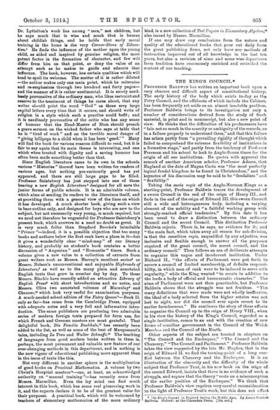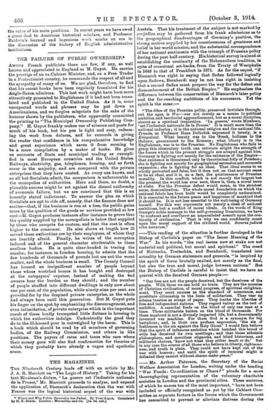THE KING'S COUNCIL.*
PROFESSOR BALI:II-six has written an important book upon a very obscure and difficult aspect of constitutional history. The early history of the body which exists to-day as the Privy Council, and the offshoots of which include the Cabinet, has been frequently set aside as an almost insoluble problem. Professor Baldwin brings to its investigation not only a number of considerations derived from the study of fresh
material, in print and in manuscript, but also a new point of view. He thinks that the difficulties of his predecessors have "lain not so much in the scarcity or ambiguity of the records, as in a failure properly to understand them," and that this failure has arisen partly from "a prevailing rigidity of thought which
failed to comprehend the extreme flexibility of institutions in a formative stage," and partly from the tendency of Professor Freeman and his school to look to Anglo-Saxon times for the origin of all our institutions. He quotes with approval the
remark of another American scholar, Professor Adams, that England at the date of Magna Carta was "the most perfectly logical feudal kingdom to be found in Christendom," and the keynotes of his discussion may be said to be "feudalism" and " flexibility."
Taking the curia regis of the Anglo-Norman Kings as a starting-point, Professor Baldwin traces the development of a sworn Council in the end of the reign of Henry III., and finds in the end of the reign of Edward III. this sworn Council still a wide and heterogeneous body, including a varying element of the nobility and "a faithful working group with
strongly-marked official tendencies." By this date it has been usual to draw a distinction between the ordinary
Council and the secret Council. This distinction Professor Baldwin rejects. There is, he says, no evidence for it; and " the main fact, which takes away all reason for sub-division,
is that the consilium regis, unqualified by any adjective, was
inclusive and flexible enough to answer all the purposes required of the great council, the secret council, and the ordinary council." Then follows an era of deliberate attempts to organize this vague and incoherent institution. Under Richard II., "the efforts of Parliament were put forth to secure a council of limited membership, of definite responsi- bility, in which men of rank were to be induced to serve with regularity," while the King wanted " to create in addition to
the lords a body of official and bureaucratic character." The aims of Parliament were not then practicable, but Professor Baldwin shows that the struggle was not fruitless. "The
many definitions that were made were not wholly ineffective.
the ideal of a body selected from the higher estates was not lost to sight, nor did the council ever again revert to its earlier formlessness." He continues the story of these efforts to organize the Council up to the reign of Henry VIII., when in his view the history of the King's Council, regarded as a
single institution, comes to an end with the creation of new forms of conciliar government in the Council of the Welsh Marches and the Council of the North.
Other aspects of the subject are treated in chapters on "The Council and the Exchequer," "The Council and the Chancery," " The Council and Parliament." Professor Baldwin takes the view suggested by the late Mr. Hughes, that in the reign of Edward II. we find the turning-point of a long con-
flict between the Chancery and the Exchequer. It is an illustration of the obscurity and the difficulty of the whole subject that Professor Tout, in his new book on the reign of • the second Edward, insists that there is no evidence of such a struggle, and argues that the theory " rests on a misconception of the earlier position of the Exchequer." \%e think that Professor Baldwin's view requires very careful reconsideration in the light of Professor Tout's work, but this does not affect • 7 he Kir.g's Coumtil in England during the Middle Ages. By James lusdick Baldwin. Oxford: at the Clarendon Press. [1ee. net.]
the valve of his main positions. In recent years we have owed a great deal to American historical scholars, and Professor Baldwin's learned and ingenious work marks an era in the discussion of the history cf English administrative institutions.











































 Previous page
Previous page